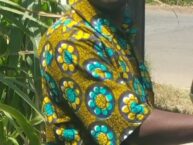 Ralph Monday is an Associate Professor of English at Roane State Community College in Harriman, TN., where he teaches composition, literature, and creative writing courses. He has been published widely in over 50 journals, including Agenda, The New Plains Review, New Liberties Review,Fiction Week Literary Review, Crack the Spine and many others. His poetry has been nominated for a Pushcart Prize and Houghton Mifflin’s “Best of” Anthologies, as well as other awards. A chapbook, All American Girl and Other Poems, was published in July 2014. A book Lost Houses and American Renditions is scheduled for publication in May 2015 by Aldrich Press.
Ralph Monday is an Associate Professor of English at Roane State Community College in Harriman, TN., where he teaches composition, literature, and creative writing courses. He has been published widely in over 50 journals, including Agenda, The New Plains Review, New Liberties Review,Fiction Week Literary Review, Crack the Spine and many others. His poetry has been nominated for a Pushcart Prize and Houghton Mifflin’s “Best of” Anthologies, as well as other awards. A chapbook, All American Girl and Other Poems, was published in July 2014. A book Lost Houses and American Renditions is scheduled for publication in May 2015 by Aldrich Press.
Forces that Drove the Poem
If I were ancient Greek Erato would
be the muse driving the chariot. Satyrs,
epic heroes, wine dark seas, hollow horses—
all depicted on a golden shield made
by the gods would plough the field melodious.
If Knight in shining white armour, the maiden
pedestaled to receive my courtly love,
this is the steed that I would ride to adore
the beatific vision from afar, unspoiled,
perfect love presented in a perfect rose.
If Dante, lost in the Dark Wood, allegory
inspired, the poem becomes spiritual
necessity for traveling the infested
circles of poetic sin, Virgil but
a quaint companion, afterthought, Francesca .
If a passion filled Romantic the search
for the sublime obsesses lyrical lines.
Romantic love an aching unfilled hole
in the heart, mortared only by imagination’s
dream, the rational put away to bed.
If a Modern the meaningless search for
history’s truths is a fragmented wound
healed by grand narratives, science’s march,
a return to myth made personal,
a lost generation moved by nation’s loss.
If postmodern petite narratives are
the driving force, diversity a religion
where parody, pastiche, becomes a
Frankenstein relativity quilt, reality
a deconstructed construct for the mind.
All together now, like three musketeers,
these six muses wrote the poem, the poem wrote
them. History’s fingers sluicing through debris,
random moments plucked from time’s gate,
passing on and away.
Turn of the Screw
The machines still hum, but their spirit
Is rusty, guts constipated, reduced from
High priest to suspected witch.
All about the lunar generation, its gestated
Offspring, search for oily moles, greasy
Birthmarks, fine hairs sprouting from ball bearings.
They carry green bibles, preach scriptures
Proclaiming the only order is disorder,
Abstract projections aimed by an arrow.
Humanism replaced by post-humanism,
A hierarchical cosmos conquered by
An expanding bang, unity dismembered,
All great narratives made to whimper,
Even the machines muddle through the
Sad stories.
Autonomy of self, like a fallen cake, fractured
Into multiple identities of couch analysis that
Even a perfectly formed gyroscope cannot center.
Black Holes in a Bucket of Mud
So simple a task stirring mud with an electric drill
to tile a bathroom floor. The blade turning,
pirouetting steel ballerina, white mud following
the shaft’s spin like a wasp chewing up paper
for a nest. In the rotation a strange observance
came about, for a vortex sprang into being at
the center, mud rotating around until it was
swallowed up like stars and other space debris
orbiting a hungry black hole. Around and around
and the pattern was the same, a spiraled conch
shell, Katrina viewed from orbit, a hawk’s ascending
gyre, spiral galaxies in all of space’s dark corners.
Here in this bucket of muck was Whitman’s answer
to the child musing about the grass, Blake’s
grain of sand. Finished stirring the wet stuff, troweled
it out on a concrete floor—covered up the universe
with tile.
Blackbird Testament
At dusk the blackbirds sprang up
From the stubble of a van Gogh
wheat field
in unison, primitive force explosion.
A storm cloud of matted ink periods
moving simultaneously in harmony
like a barbershop quartet.
The flock was not broken, knew what
to do without knowing. An ancient
unity possessed them, but it was
the two of us standing in the cold,
watching, that needed exorcism
where we were mute
in the silence spanning years
of slammed doors, broken dishes,
flicker of TVs in separate rooms.
The blackbirds wheeling now like
an angry storm funneled up as an
organic whole,
some dark opal collection, not
the broken thing we were seeking respite.
We peered at them
where they vanished like some medieval
specter at the thin edge of the field.
We knew they understood earth’s
magnetic cello sounding out through
the stream of their thoughts, flapping
wings, a text carved against the twilight, a
bitter bible we did not wish to read,
for we tongued the testament.
Goodbye Berlin
Germany flies across Netflix, sepia shadows,
1920s men and women conjured from the land
of the dead on imprinted celluloid the way a
chilled bug crawls across a log blind to the
thing waiting to eat.
Surreal these Berlin rallies, Nuremberg
nights, eagle perched on top of a swastika,
backlit by fires that have never been
permanently extinguished like the smoldering
Gehenna piles kissing Jerusalem—mein
kampf man smiling, in brown, fireworks
splitting a firmament that will know bombardment
of the soul.
These films speak tongues of the perished, digitized
days, proof history is not dead—dimming though—like
a camera shot fading to black. Nazi myth monstrous
as the dark heart of a stepmother, mad Aryan days
settling over a nation’s psyche, century’s sirocco.
The Berlin bunker, refuge of the damned–
gasoline soaked bodies—history’s pyre.
Late Writing
I stay up late writing, not in a clean
well lighted place, but in the darkness
with no shadows against the trees.
My lover lies sleeping and exhausted.
When I looked at her, so innocent,
I wonder if sleep brings a return
to innocence. Is this a gift that each
evening we return to a time before
we knew the dark, that never never land
of language spoken by a cock’s morning
serenade, the fall between the stars
no more than a gentle eye blink—
not a maddening rush into an eternal
abyss, like Milton’s Lucifer?
Perhaps we sojourn into the state
of Whitman’s child wondering
what is the grass, without an answer,
semantics inadequate
in conveying the red fused haste
that drives us to take up pen, bottle,
the day’s opium, religious pew,
where we know without understanding
that we can only knead clay
for a time.




3 comments for “New Poems by Ralph Monday”